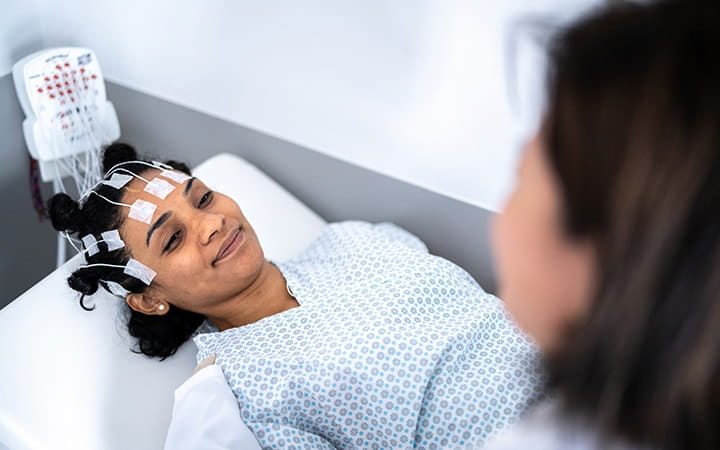Sleep Lab or Home Sleep Test: Which Is Right for Me?
September 13, 2022

If you’re having sleep disturbances and don’t feel rested during the day, you might see a specialist and undergo a “sleep study” to determine if you have a disorder such as obstructive sleep apnea.
Sleep studies involve monitoring breathing, heartbeat, blood oxygen levels, brain waves and other measures, depending on the type of study. Some patients are sent home with portable monitors, while others spend a night at a sleep lab for testing.
When is an at-home study appropriate versus evaluation in a sleep lab? University Hospitals sleep specialist Dennis Jurcevic, MD, breaks it down.
Home Sleep Testing
Many patients prefer undergoing a sleep study in the comfort of their own bed. As technology improves, home testing has become more popular. But it is not for everyone.
A home test does not capture the same amount of data as an in-lab test, and it is not as accurate. Home testing is typically used to assess obstructive sleep apnea, a common sleep disorder characterized by interrupted breathing during sleep.
“I would consider using a sleep test at home to detect obstructive sleep apnea, but it may not rule it out,” Dr. Jurcevic says. “The accuracy is limited in some cases. It may over- or under-diagnose, depending on the type of home study you have.”
Home testing typically is recommended for patients who are generally healthy. Medical conditions such as congestive heart failure, obesity and chronic obstructive pulmonary disease (COPD) can affect results of home testing.
“If you have COPD or heart failure, you can get a false test result due severe oxygen saturation drops during sleep that can be misrepresented as sleep apnea,” Dr. Jurcevic says.
Traditional home monitoring measures breathing and blood oxygen levels, but does not typically measure brain activity with EEG. Using EEG enables doctors to determine when you’re awake or asleep, and evaluate and diagnose additional sleep disorders.
“That has been a limitation of home studies because we do not accurately know the actual amount of times that the patient is awake or asleep during the test,” Dr. Jurcevic says. “Now some home studies use EEG, so we will be able to stage sleep easier. It gives us a more accurate picture than we had in the past.”
Testing at a Sleep Lab
Testing in a sleep lab involves placing sensors on the head, face, chest and limbs to record breathing, muscle and eye movements, brain wave changes, oxygen levels, blood pressure and electrical activity of the heart (EKG).
These sophisticated tests enable doctors to diagnose a range of sleep disorders, including:
- Obstructive sleep apnea
- Central sleep apnea Narcolepsy
- Periodic limb movement disorders
- Parasomnias
“In a lab study, we can accomplish not only diagnosis but sometimes treatment,” Dr. Jurcevic says. “If we diagnose apnea and it is severe enough, we can start them on CPAP (continuous positive airway pressure) that night and find the right therapeutic pressure for them.”
Could spending the night in a sleep lab interfere with the tests? Dr. Jurcevic said some patients have difficulty sleeping, and doctors may prescribe sleep aids to help.
Whether being tested at home or in a lab, diagnosing sleep problems is critical to overall health and well-being. Long-term sleep disruption can increase risk of high blood pressure, type 2 diabetes, and cause accidents. It may also affect mood, memory and cognitive function.
People concerned about sleep problems should talk to their doctor, Dr. Jurcevic says. Sleep issues in some cases can be corrected with lifestyle changes, but your primary care doctor may recommend an evaluation by a sleep medicine specialist.
Related Links
University Hospitals offers a full range of treatment options to help improve your sleep and enhance your quality of life. Learn more.


